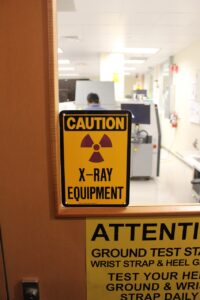
Making sure to keep safety standards when using scales or balances in a hazardous setting is key.
Many times, scales and balances are used in laboratory or manufacturing settings, and sometimes those facilities may house potentially toxic or hazardous materials. In some cases, these facilities may also need to weigh hazardous materials. Since many scales or balances are electric-based, keeping them around flammable chemicals or gas may cause acute safety risks if improperly maintained or handled. Therefore, it is extremely important for every facility to use scales or balances to understand how to properly weigh in hazardous conditions. Curious about how to do this? Look no further than this write-up brought to you by The Scale People.
Government Compliance
Oftentimes, scales or balances in a hazardous setting will need to be authorized and pre-approved by the federal, state, and/or local government(s) before installation can occur. This is most common when the scale or balance in question is being implemented at a facility that could be a potential public risk, either by local pedestrian proximity or by traffic. Usually, the government that will help in approving this would be the department of health and safety. Once the initial conditions are met, the scales or balances will be approved for installation, and further concerns can be addressed.
Safety Procedures for Scales or Balances
Usually, to find if there truly is a risk of hazardous materials, the surrounding area will be marked off into a “zone,” which can then be used for three different safety concerns. The categories are as follows:
- hazardous/flammable gas, vapor, or mist (Zones 0, 1, 2)
- hazardous/flammable debris or dust (Zones 20, 21, 22)
There are different variables for each zone, but basically, nothing that could potentially cause a fire or explosion in these areas will be allowed. This means that, in general, no electrical-based scales or balances can be used within these zones for everyone’s safety. However, there are some types of balances or scales that are developed specifically with lower power for zones that are not at high-risk levels. Since these greatly vary by facility, options can be discussed with The Scale People experts but ultimately the end-user will dictate the type of environment the equipment needs to operate in safely.
General Rule
The general proceedings when approaching weighing with scales or balances in a hazardous setting is to limit as much electrical activity as possible. An easy solution is to use completely non-electrical scales or balances but most of the times these are not as accurate when using a digital scale or balance. Make sure the scale or any equipment being used is specifically regulated to the government-designated zone type. This is the best way to get started with weighing in highly flammable conditions.
CONTACT THE SCALE PEOPLE FOR YOUR WEIGHING EQUIPMENT Calibration and Sales NEEDS IN RICHMOND, VA!
Since 1956, The Scale People have earned a reputation as the finest service provider for calibration and repairs of weighing equipment in the mid-Atlantic area. Our sales team can help work with you to find the best weighing equipment for your application. We currently have offices in Columbia, MD, and Newport News, VA, but we offer our services nationwide. Over the years, we have built up a long list of satisfied clients from a wide variety of industries, including pharmaceutical, food and beverage, and government manufacturing. We are a fully ISO/IEC 17025:2017 accredited service company providing calibration and repairs of balances, pipettes, dynamometers, force measurement and more… All of our services have a 100% satisfaction guarantee. We’re only a phone call away at +1 (800) 451-9593. To learn more about what we do, follow us on Facebook, Twitter, and LinkedIn.
